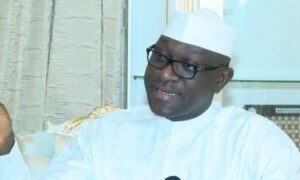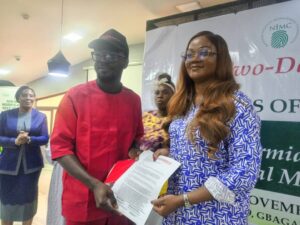
Nigeria @61: Despite N13.38trn education budget in 31 years, public sector officials train children abroad
…More years of industrial action by workers — Experts
…Education sector has grown in quantity, not quality — University Don
…Govt, philanthropists need to invest more in education – Abimbola
By Racheal Oyelola, Abimbola Abatta, Akintunde Jacobs & Uthman Salami
Despite approval of over N13.38 trillion for the education sector in the past 31 years of its budgetary allocation, investigations revealed that public sector officials prefer training their children abroad to receive qualitative education.
Many have argued that the United Nations Education, Science and Cultural Organization had stipulated a 25 per cent minimum benchmark as international standard for education budgetary allocation for any country. However, facts have dispelled that benchmark.
Out of all the commissioners in Nigeria and Minister’s, 90 per cent of them are currently training their children in private universities abroad. This data obtained by Nigerian NewsDirect during investigation furthers shows that about 47 per cent of the public officials have most of their children enjoying training in United Kingdom.
This further reveals that education budget have been spent more on foreign scholarship than strengthening infrastructures and empowering staff in Nigeria’s education sector.
The actual benchmark for budget, UNESCO recommended, stands within 15-20 per cent; which in any case, is far higher than what Federal government has been allocating for education in each year of the 31 years. The global organisation said it recommended the budgetary benchmark to enable nations to adequately cater to rising education demands.
The highest Federal allocation the sector would receive, which broke the jinx, was during the Military regime in 1997 when the then head of State, General Sani Abacha allotted over 17.59 per cent of the year’s budget to education sector.
Meanwhile, the least of allocation the sector got was in 2021 budget when President Muhammadu Buhari approved just about 6.3 per cent of its national budget on the Federal Ministry of Education which represents a sum of N742.5 billion out of the total N11.7 trillion budget.
Over all, despite this huge sum of money, Nigeria’s literacy level also dangles below 75 per cent threshold. The literacy rate for 2018 was 62.02%, a 10.94% increase from 2008. For 2018, it was 62.02%, a 10.94% increase from 2008. Nigeria literacy rate for 2008 was 51.08%, a 19.12% decline from 2006.
Most recently, according to the data gathered from Trading Economic, the Nigerian literacy rate, youth total (% of people ages 15-24) in Nigeria was reported at 75.03 % in 2018.
The poor funding of the sector has contributed to the deplorable state of federal institutions with many facilities due for renovation.
Tertiary Education Trust Fund Intervention
Not long ago, as reported by Nigerian NewsDirect, the Chairman TETFUND, Alhaji Kashim Ibrahim-Imam announced the release of N1.67 trillion to 220 tertiary institutions between 2010 and 2020.
Alhaji Kashim stated that the amount was disbursed to public tertiary institutions including Universities, Polytechnics and Colleges of Education across the six geopolitical zones of the country during the period of 10 years.
The breakdown shows that Universities received N732.13 billion representing 50 per cent of total amount allocated to tertiary institutions during the period.
This comprises of 43 Federal universities and 43 state-owned universities. Also, 65 Polytechnics received N499.12 billion while 69 Colleges of Education received N439.57 billion from TETFUND between 2010 and 2020.
Areas of intervention funded by TETFUND annually during the period include physical infrastructure/upgrade, scholarship for academic staff, library development, Institution based research (IBR), Manuscript development, Academic research journal, project maintenance, information technology support, Entrepreneurship centres, equipment fabrication and teaching practice. Also Special/Designated intervention by TETFUND includes Special High Impact Intervention, National Research Fund, Disaster Recovery and Higher Education Book Development Fund.
The Executive Secretary, TETFUND, Professor Suleiman Elias Bogoro in his presentation explained that Infrastructure received special attention as a result of decay and collapse across public tertiary institutions in Nigeria.
To address the decay, he disclosed that 16,982 various infrastructure projects were funded across the country between January and December 2020.
He said, “Considering the projects carried out since inception, based on annual allocation to institutions over the years (2011-2021), it is estimated that a total of over 152,838 various infrastructure projects have been carried out across various public tertiary institutions.”
Still, all appears not to be well with the sector as various institutions continue to be greeted with moribund infrastructures, system continue to witness ceaseless industrial actions.
Academic staff Union of University’s (ASUU) unending industrial actions
For many years, teaching and non-teaching unions in tertiary institutions have been complaining about poor funding, poor conditions of service and welfare, over which they have embarked on countless strikes on several occasions.
Incessant industrial actions especially by the members of Academic Staff Union of University (ASUU) in recent times has caused a loss of confidence into the sector.
Findings revealed that ASUU has embarked on strike since 1999 to 2020 for not less than 1,500 days over various reasons, the large chunk of it hinged on funding of the sector. This is to say less than other unions such as Academic staff Union of Polytechnics (ASUP) and their counterparts in Colleges of Education.
Nigeria’s education sector has grown in quantity, not quality —University Don
As Nigeria clocks 61, the deficiency in the nation’s education sector has been ascribed to inadequate funding, poor management as well as the delimiting legal system.
A financial expert and lecturer at Obafemi Awolowo University (OAU), Dr Tunji Ogunyemi, revealed the above in an interview with Nigerian NewsDirect’s correspondent.
According to Dr Ogunyemi, Nigeria’s education sector has only grown in quantity while the quality of the education, in terms of the exportability of the value of graduates, has nosedived.
Noting that private universities are the least funded tertiary institutions in Nigeria, Ogunyemi revealed that Federal institutions receive an insufficient allocation from the government in relation to the cost of running such institutions.
He said: “In education, we are moving very fast slowly. In other words, we are making haste very slowly. There is no doubt that Nigeria has grown in the education sector, but we have only grown in quantity.
“We have not grown in what we call appropriate education for the economic development. What I mean by that is that if you calculate the total number of universities, from 1960, we have grown.
“About 61 years ago, we don’t even have a university. The University of Ibadan then was just a college, not a university. It did not gain its full strength as a university until 1963. But even if we calculate it as a university, we had only one university 61 years ago. Today, we have 187 universities; 45 of them are federal. So, you will not say we have not grown in that area. We have grown!
“In the year 1960, the total number of graduates in Nigeria whether abroad or inside Nigeria was just 84. Today, they are in their hundreds of thousands. That is even if we don’t include some Polytechnics. You also will not say that is not growth. Growth means a quantitative increase in the value of a thing, but development means both quantitative and qualitative progress in the value of a thing. We have actually achieved none. That is why funding of the universities in Nigeria is inadequate.
“In fact, the least funded universities in Nigeria, it will surprise you, are the private universities. A lot of businessmen have gone to establish private universities, thinking that they are sources of income, not knowing that universities are a minimum of 50 years of continuous investment without turning in any profit.
“Obafemi Awolowo University is just in its first phase. It was in the zero phase for the first 50 years. We are just in the first phase of development, and we have been in existence now for 60 years. So, what that means in essence is that the quality of our education, in terms of the exportability of the value of our graduates has nosedived.
“The quality of our graduates in terms of finding jobs that are appropriate to their skills, not a medical doctor that is writing ICAN. Can you imagine a medical doctor that is going to write ICAN exam? Those have also nosedived because there is unemployment across the board. But in terms of the quantity of medical doctors we have in Nigeria now, we have grown significantly. But compare the medical doctors we produce in Nigeria relative to the number of hospitals, you will see that we have actually not achieved anything. Because we have medical doctors than hospitals can ever absorb. That’s the truth.
“Federal Universities are also poorly managed. For example, Obafemi Awolowo University only gets 100 million naira every year to maintain its utility. Utility means refuse collection, refuse disposal, refuse management, electricity, the lawns, among others.
“Just check it anywhere. This university spends 67 million naira per month on electricity. Ibadan Electricity Distribution Company (IBEDC) will come and collect 67 million naira from Obafemi Awolowo University every month. Otherwise, they will cut us off. Before we were paying 50 million naira. Imagine now, 67 million naira per month and what we get from the federal government is just 100 million naira per year. And we don’t have the authority to charge students fees to be able to cover our cost.
“We have a legal system also that delimits the university from growing, and the results, one, we will just roll out graduates who don’t know their right from their left. Two, even if they know their right from their left, they don’t have an exit point from where they can work. And three, they have learnt skills that the market is not requiring. Employers don’t want the skills that our universities are producing, and it is a shame.”
Government, philanthropists need to invest more in education – Abimbola
A don at the Adekunle Ajasin University (AAUA) Akungba-Akoko, Ondo state, Dr. Gbenga Abimbola, has tasked governments at all levels to massively invest more in educational sector saying no nation can developed without budgeting good allocation in education.
Dr. Abimbola, who spoke with Nigerian NewsDirect on Wednesday in a phone call, pointed out that “all developed countries, had invested massively in education but its quite unfortunate that Nigeria invests less than ten per cent of its yearly budget on education.”
He said, “For our country to be relevant, governments at all levels must increase their annual budget in education. We still need a lot to do on our educational system in Nigeria, even though we have increased in quantity but not increased in quality.
“What I mean by quality is that the graduates we are producing are in decline, we don’t have enough facility to go round, numbers of our students are increasing while the number of our facilities are not increasing, number of teachers are not increasing compared to the number of students we have.
“The infrastructure is dilapidating and it shows that we still need to do a lot.”
According to him, “We need to do a lot in increasing personnel, teachers at all levels of our education should be increased.
“Government needs to look at the production of teachers, giving them training and retraining.
“We also need to look at our infrastructure, the capacity of our many institutions are very low, we should be expanding our infrastructure and we should have enough facilities to train students, we need more equipment for them.
“Also, our orientation must be change, the majority orientation of our students is for them to go to school so that they will get job. While some are getting certificate without defending it.
“So, people should see it that they are going to school not to get certificate alone but to better their lives without depending on white caller jobs.”
Abimbola, who is a senior Lecturer at the Department of Mass Communication, AAUA, however, tasked the government at all levels to invest more on education.
“UNESCO has advised that if we want to meet up with our educational standard, each country should budget at least 25 per cent of income to education. But it is quite unfortunate that no government had gone beyond 10 per cent budget to education in Nigeria and it shows that we are not really budgeted enough to education.
“It is money we need to expand the infrastructure, it is money we need to hire more teachers, and it is money we need to give scholarship to students.
“Also, philanthropists and well-meaning Nigerians should also invest in education and not for profit issues alone. I think government needs to orientate and beg our philanthropists to make more provision for less privileged people in terms of discount and the rest so that they will have access to education.
“But, so far so good, we can say that we have moved forward our educational system. If we look back at the independence, we will see that the level of our education in Nigeria was very low compare to now, the level of literacy has increased,” Abimbola said.



